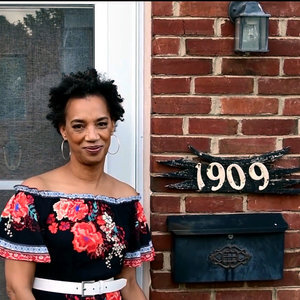Wilma Jones grew up in Arlington’s Hall’s Hill neighborhood. She’s lived in four different locations in the county, but her childhood home is still her favorite.
For Wilma Jones, life in Arlington is steeped in family history and deep community ties to the Hall’s Hill neighborhood.
Her great-grandmother was born a slave in Norfolk in 1847. After the Civil War, she walked the 200-some miles to Arlington with a group of freed slaves. Many of them worked for white families in Cherrydale, but the KKK was active so they sought safety in Hall’s Hill. (Learn more about the history of Hall’s Hill.)
It was there that Wilma, the youngest of seven children, was born and raised.
“Until I was about seven years old Hall’s Hill was the center of my universe,” Wilma said. There were “loads and loads” of kids in the neighborhood, many whose families were related and intertwined with Wilma’s. They played jacks and jump rope, kickball and pretend. They attended movie nights and other social gatherings at Mt. Salvation Baptist Church.
“I didn’t really know any white children,” Wilma said. Then Arlington schools integrated, and Wilma was suddenly a minority in the classroom. She attended Stratford for junior high and Woodlawn (now HB Woodlawn) for high school. Wilma said she “assimilated pretty well,” and her friends in Hall’s Hill remained close.
It wasn’t her plan to stay in Arlington as an adult—she wanted to live in D.C.—but her uncle had a stroke.
“He was expected to recover, so my mother asked my brother and me to move into his house while he was in rehab,” she said. But her uncle had a heart attack and died. Wilma and her brother bought the house from the estate because they wanted it to stay in the family. That was in 1988, and she still lives there.
“The reason I stay at this point is history. This is where I’m supposed to be,” Wilma said.
She’s seen Arlington change over the years. During her childhood there was more discrimination and racism. For her, the 1970s through early 2000s were Arlington’s golden era of friendliness and community focus. Now, she worries that business and money have taken priority and people whose families have lived here for generations can no longer afford their homes. She cites one example on the 1900 block of Culpepper.
“A new company made it high end and raised the rent. Literally all those families are gone,” Wilma said. “It changed the character of the block and displaced a lot of people who worked in the county and had kids.”
Like her parents, Wilma became involved in civic work after she married and had children in Arlington. As president of the John M. Langston Citizens Association she’s working to address the issue of affordable housing. She wants the county to be more creative in finding solutions, such as making it easier to turn single-family properties into duplexes or triplexes. Wilma applauds churches that are using their space to create housing that low- and middle-income earners can afford.
“I love Arlington I’m going to do the best I can to make it a great place.”
Wilma Jones is the author of My Hall’s Hill Family: More Than Just a Neighborhood, a historic memoir that tells the history of the neighborhood from her family’s perspective.


